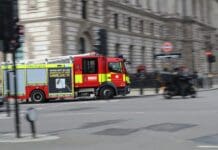This post is also available in:
 עברית (Hebrew)
עברית (Hebrew)
The proposed wall along the US-Mexico border has been causing budget cuts in other crucial areas. Three airport security programs put in place after the Sept. 11, 2001, terrorist attacks, will be eliminated by the President Trump Administration, diverting the money to help build a wall along the U.S. border with Mexico. It would shift the burden for funding police in airports to state and local governments.
According to the washingtonpost.com, the White House budget released recently prioritizes “frontline border security” and President Trump’s “commitment to construct a physical wall along the southern border.” The proposal says that $80 million could be saved by cutting grants that pay for local police in airports, eliminating a program that sends uniformed armed officers to sweep public facilities and ending the training for Transportation Security Administration officers in how to recognize unusual passenger behavior.
TSA officers do not have police authority and must summon local officers when issues arise.
The budget document describes the three programs slated for elimination as “underperforming,” a description at odds with the assessment of a former TSA administrator and a former senior official at the Department of Homeland Security, parent agency to the TSA.
“These are important programs,” said the former DHS official, who spoke on the condition of anonymity to speak candidly. “It’s hard to quantify it, because all of this is about risk. This is about security, so the more security elements we have in place, the more secure the traveling public in railroad stations and airports are going to be.”
John S. Pistole, the former FBI deputy director who headed the TSA from 2010 to 2014, said the TSA is in a better position to find ways to economize its efforts than the White House.
The budget proposal does not appear to reduce the number of TSA officers assigned to airport security checkpoints. It increases the overall discretionary budget for the DHS by 6.8 percent, to more than $44 billion.
“What has not changed is that terrorists still consider airlines and airports high-value targets,” former TSA administrator Peter V. Neffenger said in a report in December. “The U.S. air transportation system, especially passenger airplanes, remain a primary target of every global terrorist network. That has not changed since before 9/11 and will define the threat environment for years, maybe decades, to come.”
One program slated for elimination, at a savings of $57 million, according to an earlier budget document, is one that sends teams of armed uniformed TSA officers on random sweeps through airports and other modes of transportation. Commonly known as the VIPR program (for Visible Intermodal Prevention and Response teams), its intent is to create a highly visible police presence.
For example, VIPR teams were deployed to several airports and to the Washington Metro system to guard against terrorist attacks during Trump’s inauguration.
An additional $65 million, according to an earlier White House budget document, could be saved by eliminating the Behavior Detection Officer program. The value of the program was questioned by the Government Accountability Office in a 2013 report, but Pistole responded at that time that it provided a “crucial layer of security”.
“They identify a number of people who are criminals, either drug smugglers or money smugglers, even a couple of human traffickers. They haven’t detected any terrorists because, to our knowledge, no bomb-totting terrorists have tried to get on a plane,” Pistole said.
The proposed Trump budget would eliminate $45 million in grants to local police who patrol airports, contending that would “incentivize local law enforcement patrols that should already be a high priority for state and local partners.”


























